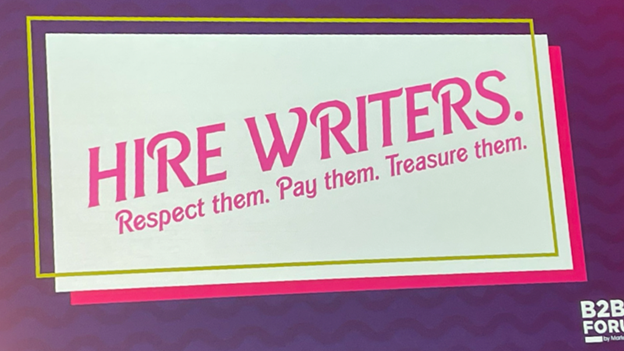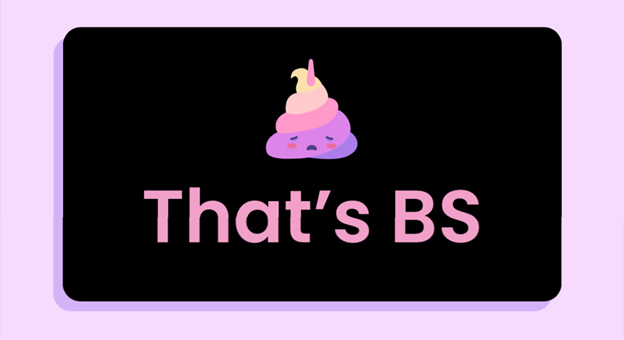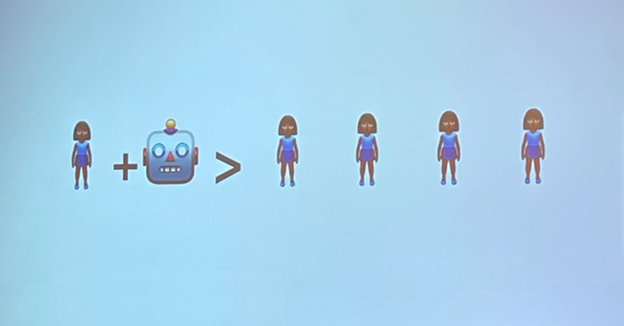During the opening session of the B2B Forum this year, MarketingProfs Chief Content Officer Ann Handley wowed and pumped up the crowd with an empathetic Barbie-inspired B2Barbie presentation.
The overall message: B2B marketers are often held to impossible standards and underappreciated despite their hard work and smarts.
Ann's point of view was crystal clear...

But then generative AI took the stage, and attendees could be forgiven if they felt they weren't "Kenough"... unless they used generative AI to create a digital clone of themselves to work alongside them.
In a particularly chilling moment, Ann asked Trust Insights Co-Founder and Chief Data Scientist Christopher Penn what kept him up at night about AI, and he mentioned the Israeli military's use of AI to select bombing targets.
Putting aside military and police applications (which I'll assume we'll all lose sleep over), Ann's question resonated with me. So, I'd like to cathartically share some of the things that worry me most as a marketer about generative AI, which was a pervasive theme of the conference.
1. Companies won't stop at outsourcing the 'burnout' or low-value work
Employees at some companies will decide for themselves which work is so low-value that they'd rather have GenAI do most of it. However, companies will ultimately decide for most employees. As GenAI's capabilities increase, they'll soon be outsourcing work that employees find fulfilling today.
2. Companies won't reinvest the time saved by GenAI
However "low-value work" ends up being defined, the logic is that having GenAI do more of that frees up employees to take on more strategic tasks. That will almost certainly be the case.
However, the idea that GenAI will pave the way for four-day work weeks seems less on solid ground. Only entrepreneurs will be in a position to reinvest time saved with GenAI into their private lives.
3. Companies will create digital doppelgängers of employees or influencers
Some people have distinct voices and writing styles that help them attract large audiences. If lacking such an influencer or having such a person and then losing them, a company could use GenAI to mimic the voice in future content by training a model on content the influencer created.
4. Art and craft will be reduced to ideas
Christopher Penn said people using GenAI will no longer need skill to execute on their ideas. With the right prompts, GenAI can turn your idea into a song, poem, image, comic book, or novel—in addition to all the formats that marketers use routinely.
For people who lack a particular artistic skill and the time to dedicate to that craft, that's empowering. But for people who have that artistic skill and have dedicated time to honing it, it's power-stealing. Essentially, when everyone's an artist, no one will be.
5. Content creators will become content editors
GenAI is drafting everything from emails to video scripts and blog posts to books, so some of today's writers will become editors. That's not to disparage editors; I was a managing editor for years, and I still do considerable editing work today. But it's a different job that brings a different kind of satisfaction.
6. AI tools will be given human names
The ability to mimic humans doesn't make GenAI human. It's just a stochastic parrot, a mimic machine.
But GenAI models are already so good, they're tricking even knowledgeable people into ascribing human value onto these machines—none of which have feelings, aspirations, families, or any of the needs that us humans have. Giving AI tools human names will confuse things further.
Even more insidious, some are claiming the converse: that people are just organic machines, which devalues and dehumanizes people.
(I reserve the right to potentially feel otherwise when an AI achieves human-level sentience, but that day won't be "until 2030 at the earliest," bestselling author Andrew Davis told us during his keynote.)
7. Brands and their ambassadors will appear less authentic and trustworthy
Authenticity has been the rallying cry of Gen Z-ers and Millennials. During his session, TopRank Marketing Co-Founder Lee Odden stressed, "People trust people, not brands." However, if authenticity is about being your genuine and true self—about expressing your personality and values, despite social pressures to conform—at what point does using GenAI make you inauthentic and fake?
8. GenAI will cause reciprocity to break down
This is one of my concerns about using GenAI for cold outreach. People respond to those messages when they see that effort has been put into it—which is to say, they see evidence that the sender took the time to learn about the recipient and reflect that in the message. However, if people suspect that GenAI was used to achieve that, many will feel much less inclined to reciprocate and take the time to respond.
9. Brands won't be transparent about their GenAI use
Andrew Davis urged attendees to always be clear about their use of GenAI, including when they use it to craft replies to emails, for example. But because of the aforementioned concerns about authenticity and reciprocity, and also because AI-generated content can't be copyrighted in the US, brands may hesitate.
10. GenAI laws will be far too late and too ineffective
At least, that will be the case in the US, where Congress can barely keep the lights on, and it has a laughable track record of even attempting to keep up with the pace of technology.
On the other hand, the EU will likely pass meaningful laws regulating AI development and use. In the US, it's likely that only union workers will have any degree of protection against AI.
11. GenAI will ultimately cost many people their jobs
You've likely heard that "AI won't take your job—someone using AI will." During her session, Alaura Weaver, the senior manager of content and community at Writer, surprised many attendees by (very colorfully) saying that's just not true.

She said people are already being replaced by AI—with disastrous business consequences. And she hopes that too many companies won't learn the hard way that they still need content creators and subject-matter experts to be successful.
During his breakout session, Christopher Penn described the job impact of GenAI in even starker terms, making it clear that a person using AI will replace multiple people.
I think more junior workers will be especially affected, because industry veterans are in a better position to get maximum productivity gains from GenAI while recognizing and taming its hallucinations.

* * *
Note that these are worries, not predictions. I'm giving voice to them in the sincere hope that some of them won't come true—or at least not to the degree that I fear.
That said, the genie is out of the bottle. Businesses, employees, and consumers can all see the potential of GenAI, which on net outweighs its drawbacks. Their excitement, plus tens of billions of dollars in investments, are propelling developments of AI at breakneck speeds.
That momentum will be more than enough to get GenAI past the rough spots in the road, such as controlling the tremendous costs of running these models, fine-tuning business models, and navigating the disruption of emerging new GenAI models.
For example, large language models (LLMs) are already giving way to large multimodal models (LMMs) that can accept both text and image inputs. Impressive gains in functionality, performance, and usability are on the horizon.
Again, GenAI's positive benefits outweigh its negative consequences, but that doesn't make those consequences any less real. It will be everyone's responsibility to temper those and remain empathetic to what's been lost, even as we marvel at and celebrate what's been gained.
More Resources on Generative AI Concerns
ChatGPT: Marketing Dream or Marketing Disaster? Chris Carr on Marketing Smarts [Podcast]
ChatGPT and Jasper: Powerful Writing Tools or the End of Creativity?




